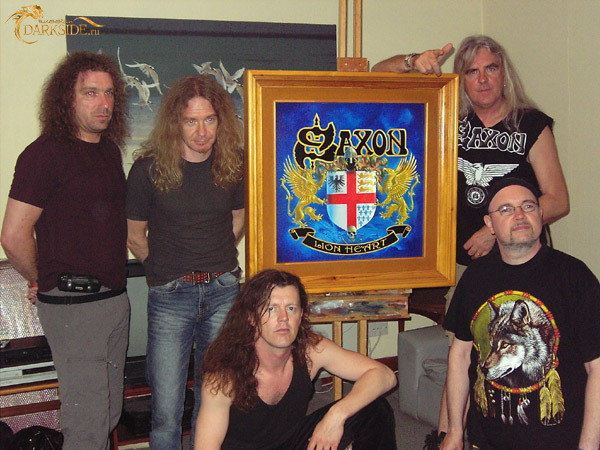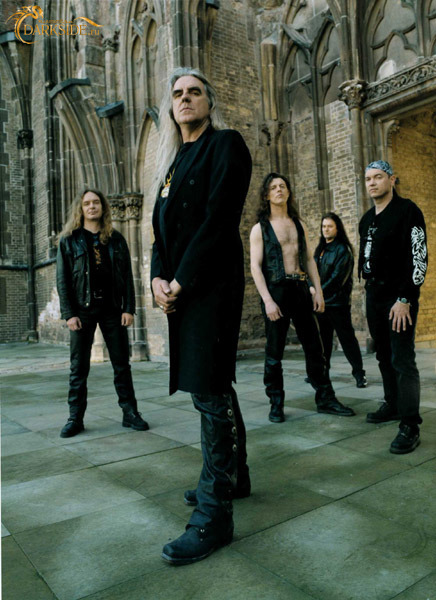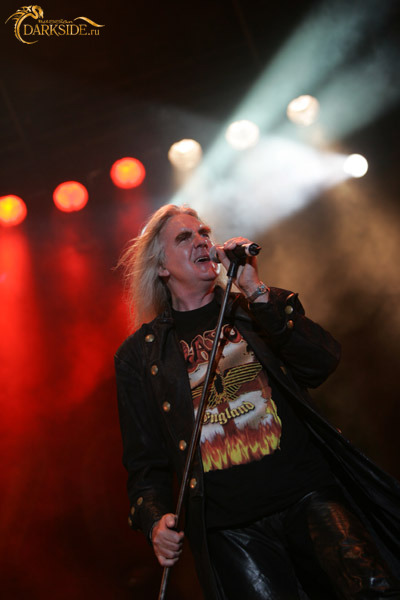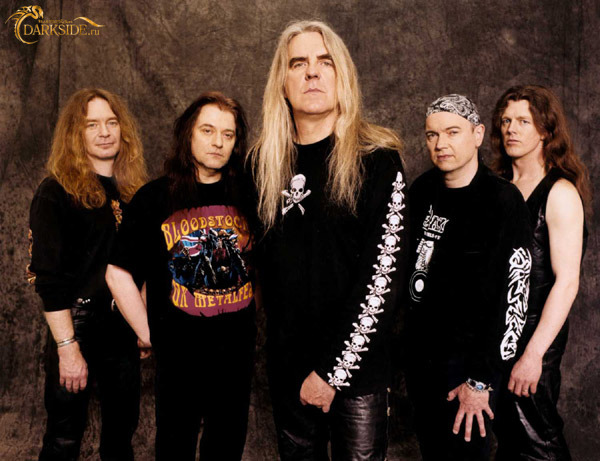
С тех пор, как мы сделали “The Eagle Has Landed Part 2”, прошло уже 10 лет, и мы решили, что пришло время записать немножко новых концертных треков. Мы хотели поместить на диск некоторые песни, которые никогда раньше не исполнялись, а также новый материал с диска “Lionheart” (2004).
На альбом попали записи с нескольких концертов 2004 и 2005 годов. Как вы решали, какой трек с какого концерта использовать? Было ли качество записи единственным критерием, или же в ходе тех туров были какие-то особо запоминающиеся моменты, которые вы хотели «зафиксировать» для потомков?
Что касается старого материала, мы постарались выбрать те треки, которые никогда раньше не записывались «вживую». Такие песни, как “To Hell And Back Again” или “Stallions Of The Highway”, невозможно найти на других наших концертных альбомах. Мы сделали на сайте голосование, чтобы фэны сами выбрали, какие песни они хотят услышать. И что они выбрали, то мы и сыграли. А второй диск записывался в ходе турне в поддержку “Lionheart”, и на нем представлена стандартная программа того тура.
В названии ваших дисков уже в который раз фигурирует орел, и действительно, световая конструкция в форме орла была очень важной частью ваших шоу в 1980-х. Кто является ее автором? И как получилось, что вы реанимировали эту конструкцию для выступления на Вакене в 2001 году?
Мне кажется, орла сделала компания, занимавшаяся в то время световым обеспечением наших концертов. Изначально орел появился на обложке нашего второго альбома “Wheels Of Steel” (1980), а потом его перенесли на сцену. Воскрешение орла было идеей Томаса Йенсена, одного из основателей Вакена. Он хотел, чтобы мы выступили на фестивале с орлом, и чтобы Motorhead специально для того выступления воссоздали своего «бомбера» (световая конструкция в форме бомбардировщика, также использовавшаяся на концертах начала 80-х – прим. авт.). Наша конструкция все это время провалялась где-то на немецком складе, и специально по нашему заказу ее разыскали и реставрировали. На следующей неделе мы снова будем ее использовать. Вообще, мы используем орла довольно часто, когда выступаем хэдлайнерами на фестивалях. На сле
 дующей неделе мы играем с ним во Франции, а когда будем выступать на Graspop в качестве ко-хэдлайнеров вместе с Motorhead, то также вытащим его на сцену.
дующей неделе мы играем с ним во Франции, а когда будем выступать на Graspop в качестве ко-хэдлайнеров вместе с Motorhead, то также вытащим его на сцену.У Saxon особые отношения с фестивалем в Вакене, и в 2004 году ты заявил со сцены, что Вакен является лучшим металлическим фестивалем в мире…
Я на самом деле так думаю. В Вакене очень хорошая атмосфера, зрители и музыканты чувствуют себя одной семьей.
А как вы впервые оказались на Вакене? И как с тех пор изменился фестиваль?
Насколько я помню, мы выступали на самом первом Вакене в 1991, а может, 1994 году. (На самом деле, это был третий фестиваль, и состоялся он в 1992 году – прим. авт.) Именно с него все и началось. С тех пор из довольно маленького фестиваля Вакен превратился в огромное мероприятие, на котором в течение четырех дней выступают 60-70 групп.
Не секрет, что Saxon сейчас популярнее в континентальной Европе, чем у себя на родине. Довольны ли вы таким положением дел? Можно ли его как-то изменить?
Да, нам все нравится. Мы и в Англии достаточно популярны, хотя, конечно, не так, как на континенте. Хотя мы и больше времени проводим на континенте, выступая на Вакене и тому подобных мероприятиях.
Творческий путь Saxon начался в конце 1970-х, когда на пике популярности был панк. Как вы относились к панку в то время? И что ты сейчас думаешь об этом стиле?
Мы его любили и ненавидели. То есть, какие-то группы мы любили, а какие-то – нет. Например, нам очень нравились Sex Pistols, а Siouxsie And The Banshees – не очень.
А что ты думаешь о современных направлениях металла? Например, о таких стилях, как ню-метал или готик-метал?
Мне они нравятся, я люблю некоторые готик-металлические команды, к тому же некоторые из них – наши друзья и фэны Saxon.
Кто же, например?
Ну, нам нравятся Children Of Bodom, Linkin Park, Rammstein… Да много групп.
На альбоме “Killing Ground” (2001) вы записали кавер-версию “In The Court Of The Crimson King” – классического номера King Crimson. Почему вы выбрали этот трек? Вам интересен арт-рок и прогрессив?
Наш гитарист Пол Куинн в 1970-х играл достаточно прогрессивную музыку, а эта песня всегда была одной из моих любимых. Я предложил г
 руппе попробовать ее исполнить, и получилось очень здорово.
руппе попробовать ее исполнить, и получилось очень здорово.Еще одна очень любопытная песня в репертуаре Saxon – “We Will Remember” с альбома “Solid Ball Of Rock” (1991). Эта песня посвящается какому-то конкретному человеку, или же она в общем о тех музыкантах, которых уже нет с нами?
В тот период умерли довольно многие люди, кого мы хорошо знали – Фил Линотт, например. И я почувствовал, что должен написать песню в память о погибших рок-музыкантах.
А какой период в вашей истории был наиболее экстремальным? Ты когда-нибудь чувствовал, что из-за твоей игры в Saxon и соответствующего образа жизни ты также рискуешь оказаться «на другом берегу»?
Самые дикие годы в нашей истории – это, наверное, период с 1980 по 1983 года. А что касается риска, то он есть всегда, когда ты пользуешься самолетом, автомобилем или поездом. (Смеется). Да нет, на самом деле, мы никогда особо не рисковали. Мы же не сидим на наркотиках и не страдаем другими подобными пороками. Хотя иногда мне кажется, что рок-музыкант – это довольно опасное занятие.
Да уж, у вас есть песня “Flying On The Edge”, в которой ты красочно расписываешь, как в один и тот же день вы выступили на двух фестивалях в двух разных странах, и что вам пришлось ради этого преодолеть. Но скажи, а зачем вы вообще согласились эту авантюру?
Нуу, да мы подумали – а вдруг прокатит? (Хохочет).
И как, вам понравилось? Получили удовольствие?
Нет, это оказалась чертовски тяжелая работа. Но именно из такой работы рождаются легенды.
Еще вопрос про концерты – недавно вам пришлось отменить выступление в Объединенных Арабских Эмиратах после того, как один журналист написал о Saxon много гадостей в своей газете. Ты не мог бы рассказать о случившемся поподробнее?
А случилось то, что один журналист-мусульманин перевел на родной язык текст песни “Crusader”, причем перевел довольно плохо. Этот перевод очень многих задел, и власти попросили нас отменить выступление. Мы в такой ситуации практически ничего не могли сделать. Конечно, с их стороны лучшим выходом было бы попросить нас просто не исполнять эту песню, но… Ну да ладно, на всех остальных концертах мы ее все равно играем.
Здорово! Ведь это одна из моих любимых песен Saxon.
О да, она у всех в числе любимых. (Смеется).
Еще о песнях, которые любят все – несколько лет назад вышел диск “Heavy Metal Thunder” (2002), для которого вы переписали свои боевики начала 80-х. Вас чем-то не устраивали оригинальные версии этих композиций?
Первоначально планировалось сделать этот диск бесплатным бонусом к первым 30 или 50 тысячам копий альбома “Killing Ground” (2001). Однако материал получил такой резонанс, что наш лейбл решил издать его отдельно. На самом деле, это для нас было просто развлечением. Но как мне кажется, диск звучит довольно неплохо.
Этот диск охватывает ранний период вашей карьеры. А не было ли у вас планов переписать материал второй половины 1980-х, например, с альбомов “Rock The Nations” (1986) и “Innocence Is No Excuse” (1985)? Многим фэнам нравятся эти песни, но не очень нравится их звук…
Мы об этом думали и, возможно, так и сделаем. Поживем – увидим.
На твой взгляд, какова сейчас аудитория Saxon? Как ты себе представляешь типичного фэна твоей группы?
У нас сейчас очень смешанная аудитория. Среди нее довольно много молодых ребят, ну и, конечно, те фэны, которые стали нас слушать в 1980-х и 1990-х, тоже до сих пор с нами. Как мне кажется, нам очень повезло, ведь наша музыка с одной стороны традиционная, а с другой современная. У нас оптимальная смесь различных стилей.
А когда ты сам заинтересовался тяжелой музыкой? С каких групп ты открыл для себя хард-рок?
Я сначала заинтересовался музыкой 1960-х, например, группой Kinks, а также американскими группами вроде Mountain. Так я и попал в мир рок-музыки.
И сколько лет тебе тогда было?
Ой, я уж и не знаю… Лет 10-15.
А ты бы хотел, чтобы твои дети также стали музыкантами? Особенно принимая во внимание издержки рок-н-ролльного образа жизни, с которыми ты хорошо знаком…
А они уже музыканты. Один из сыновей учится играть на барабанах, а дочка учится играть на басу.
Состав Saxon уже много лет не менялся, если не считать постоянной чехарды с барабанщиками. Почему они так часто меняются? Почему Фриц Рэндоу и Йорг Михаэль пробыли в группе столь недолго?
Фриц ушел, чтобы заняться немузыкальными делами. А Йорг вернулся в Stratovarius
 и решил попытать с ними счастья еще раз. Чем он занимается сейчас, я не знаю. А в это время наш старый барабанщик Найджел Глоклер попросился назад в группу, и мы с удовольствием взяли его.
и решил попытать с ними счастья еще раз. Чем он занимается сейчас, я не знаю. А в это время наш старый барабанщик Найджел Глоклер попросился назад в группу, и мы с удовольствием взяли его.Несмотря на смены состава и звучания, один из компонентов Saxon всегда остается неизменным – твой вокал. Как ты ухаживаешь за голосом?
Да никак. С голосом мне просто повезло.
Какие из коллег-вокалистов нравятся тебе больше всего?
Да те же, что и всем – Дио, Брюс Дикинсон…
Много ли у тебя друзей на металлической сцене, или же круг твоего общения в основном лежит за пределами музыки?
Ну, у нас хватает друзей на сцене, например, это ребята из Motorhead. Правда, не скажу, что мы с ними активно тусуемся, у нас для этого слишком много дел.
Кстати, ты несколько раз говорил, что хотел бы сочинить или исполнить что-нибудь вместе с Лемми. Сделаны ли какие-то шаги к осуществлению этой идеи?
Я правда так говорил? Ну может быть… Было бы прикольно.
Уже сейчас известно расписание ваших концертов на 2007 год, а когда нам ждать нового студийного альбома Saxon?
Тоже в 2007 году. Мы как раз занимаемся сочинением материала, я сейчас говорю с тобой из английской студии, в которой мы работаем над альбомом.
На май будущего года назначено ваше выступление в Санкт-Петербурге, а в 2004 году вы играли в Москве. Как тебе понравилась страна и концерт?
Эээ… Россия нам понравилось. Было весело. Наша дорожная команда напилась водки до поросячьего визга, и из-за этого мы опоздали на самолет. Пришлось сначала лететь в Гетеборг, а там пересаживаться на поезд. Полный хаос! Но русские люди нам очень понравились, с ними приятно общаться.
А как тебе аудитория на концерте?
Неплохая аудитория. Правда, среди нее меньше молодежи, чем в остальной Европе. Может быть, к тому моменту значительная часть русских фэнов еще не въехала в Saxon.
За годы своего существования Saxon посетили множество стран. Где ты испытал самый большой культурный шок?
Наверное, в Мексике и Исландии, ну и Япония, разумеется, тоже ни на что не похожа.
Последний вопрос – первый диск Saxon увидел свет более четверти века назад. Как ты тогда представлял себе будущее группы? И насколько сбылись твои ожидания?
Мне кажется, что когда ты начинаешь играть музыку, последнее, о чем ты думаешь – это продолжительность твоей карьеры. Ты просто играешь и получаешь удовольствие. Именно так было с нами тогда, а по сути, с нами до сих пор точно так же. (Смеется).
Выражаем благодарность Максиму Былкину (Soyuz Music) за организацию этого интервью.
Роман “Maniac” Патрашов
12 июня 2006 г.
3 авг 2006